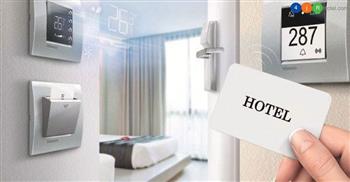What is a smart hotel?
Sunday, June 20, 2021
One of the most important technology trends in the hotel industry today is the development of smart hotel technology. This technology has the potential to benefit both hoteliers and guests, potentially improving financial outcomes, as well as customer experience. In this article, you will learn more about what a smart hotel really is, why technology is important and what are the different pluses.
What is a smart hotel?
Basically, smart hotel is a hotel that uses internet-connected devices, capable of communicating or interacting with each other. This is sometimes referred to as the Internet of Things (IoT) and means that even ordinary devices or applications can send or receive data, making them intelligent.
Hotel devices communicate with each other, allowing users to control multiple devices from a single point, such as a remote control, smartphone, tablet or smart speaker. Furthermore, devices can find and use information from the internet, allowing them to intelligently respond to user requests.
Why every hotel needs to be a smart hotel
Hilton, Marriott and other major hotel brands have rapidly developed smart room technology. However, in reality everyone in the hotel industry should prioritize turning their hotel into a smart hotelbecause it can greatly improve the customer experience, make it easier for employees, and save money. owner’s money.

Using a smart room, guests can control various components and get the room exactly as desired. Guests also quickly find important information in smart hotel rooms. In the next section of the article, you will see how smart hotels help reduce some of the operating costs.
Benefits of a smart hotel
1. Sustainable hotel rooms
From the hotel owner’s point of view, the biggest advantage that smart hotel rooms offers is sustainability. This is mainly related to the ability to save energy in the room, the devices are automated and connected to each other through the Internet of Things.
For example, light bulbs can be set to automatically increase or decrease wattage, based on the light level in the room at the time. Similarly, the air conditioning system can be configured to automatically maintain a certain temperature, in accordance with the customer’s body temperature. All of this leads to a significant reduction in energy bills.
2. Improve the level of personalization
A smart hotel also offers great opportunities for personalization. For example, the TV can be set up remotely to call guests by their own names, while guests can use a central control point to set the temperature in the room. Through IoT technology, different devices can automatically generate those conditions.
Additionally, smart TVs and smart speakers can give guests the ability to access their own accounts on services like Netflix and Spotify. In fact, the Alexa for Hotels service aims to introduce a feature in the near future where guests can sign in with their Amazon account and access their favorite songbooks.
3. Easier access to information
For customers, another great benefit of smart hotel technology is access to information. With devices like the Amazon Alexa speaker, this means a customer uses his or her voice to ask questions and then get intelligent answers. However, the devices can also be connected to other hotel services.
So, for example, a customer could use a smart hub to access information about a restaurant’s availability. This can be connected to the hotel restaurant reservation system, providing live data. One hotel went a step further, connecting wall maps to the internet, allowing guests to find information and reviews about local bars, restaurants and attractions.
4. Data-driven decision making
The important thing that those in the hotel industry must keep in mind when it comes to smart hotel room technology is customer privacy. With that said, as long as hotels are transparent and comply with data protection laws, some of the customer information collected from smart room technology can be useful.
While all customer voice commands and other data will have to be erased from devices like the Amazon Echo, certain information may be collected, including basic usage data. This allows hotels to learn what the most popular TV or radio stations are, allowing for data-driven decisions about what is set as default.
5. Pre-maintenance and repair
Ultimately, both customers and hoteliers can benefit from the smart hotel’s ability to provide for upfront maintenance and repairs. Simply put, this is achievable because IoT allows hotel staff to view performance information and operational data for specific devices, in real time.
This allows hotel staff to spot problems quickly, or even before they happen, allowing repairs to be made sooner. As a result, fewer guests experience disruption, early repairs allow hoteliers to save money on replacement equipment, and less money is lost because rooms are out of service.

Leave a Reply